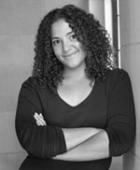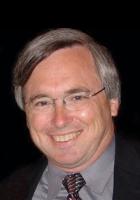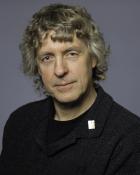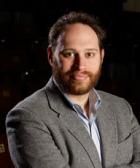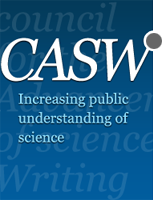Speakers
Laurie Santos
Position/Organization: associate professor of psychology, Yale University, New Haven, Conn.
Laurie Santos, Ph.D., is an associate professor of psychology at Yale University. Her current research concerns whether primates have precursors to a theory of mind, how they reason, and whether primates and humans share decision-making biases.
http://www.yale.edu/psychology/FacInfo/Santos.html
203-432-4524
Speaking:
-
Sunday, November 7th, 4:30 pm
-
Charles Seife
Position/Organization: associate professor of journalism, Arthur L. Carter Journalism Institute, New York University
Charles Seife, an associate professor of journalism at NYU's Arthur L. Carter Journalism Institute, has been writing about physics and mathematics for a decade and a half.
Speaking:
-
Saturday, November 6th, 2:15 pm - 3:45 pm
-
Nancy Shute
Position/Organization: freelance
Nancy Shute has morphed through many forms as a science writer: Editor and writer for national magazines, independent journalist, and instructor of science writing and multimedia journalism.
Speaking:
-
Saturday, November 6th, 11:15 am - 12:45 pm
Organizing:
-
Saturday, November 6th, 2:15 pm - 3:45 pm
-
Saturday, November 6th, 9:15 am - 10:45 am
-
Saturday, November 6th, 4:15 pm - 6:00 pm
-
Tom Siegfried
Position/Organization: editor in chief, Science News
Tom Siegfried, editor in chief of Science News, was born in Ohio. He earned an undergraduate degree from Texas Christian University with majors in journalism, chemistry and history, and has a master of arts with a major in journalism and a minor in physics from the University of Texas at Austin. His journalism career began at the Fort Worth Press and he later served on the journalism faculty at Texas Christian University before joining the Dallas Morning News, where he was science editor from 1985 to 2004. His awards include the American Geophysical Union’s Robert C.
Speaking:
-
Saturday, November 6th, 11:15 am - 12:45 pm
-
Emily Singer
Position/Organization: biomedical editor, Technology Review
Emily Singer is the biomedical editor at Technology Review, an international magazine and website affiliated with MIT. Her 2008 feature “Brain Trauma in Iraq” won an Eddie award from Folio magazine for best single article in a consumer or technology magazine. Prior to joining Technology Review four years ago, Emily freelanced for Nature, New Scientist and the Los Angeles Times. She has won fellowships from the Coalition for the Advancement of Science Writing, the American Academy of Neurology and the American Association for the Advancement of Science.
Speaking:
-
Saturday, November 6th, 11:15 am - 12:45 pm
-
Jim Sliwa
Position/Organization: media relations manager, American Society for Microbiology
Jim Sliwa is manager of media relations at the American Society for
Microbiology. A graduate of the Journalism School at the University of
Maryland, College Park, he worked in the Public Information Office in
the Office on Smoking and Health under Surgeon General C. Everett Koop
before joining the ASM in 1990. He received his masters degree in
public relations from the University of Maryland in 2001.For over 20 years he has been involved in all aspects of organizing and
managing the press rooms for the Society's two major scientificSpeaking:
-
Saturday, November 6th, 4:15 pm - 6:00 pm
-
Mike Spear
Mike Spear is currently Director of Corporate Communications for Genome Alberta, a non-profit genetic research funding organization based in Calgary, Alberta, Canada. Don’t hold that against him though, as most of his career was spent as a Producer, Executive Producer, and Program Manager with the Canadian Broadcasting Corporation. While there he received a CBC President’s award, a Farm Writer’s Award and his newsrooms and current affairs programs received several CBC Peer Awards and RTNDA Awards.
Speaking:
-
Saturday, November 6th, 11:15 am - 12:45 pm
-
David A. Spiegel
Position/Organization: assistant professor of chemistry, Yale University, New Haven, Conn.
David A. Spiegel, M.D., Ph.D., is an assistant professor of chemistry at Yale University. In addition to his work with antibody recruiters, he’s using new kinds of chemical synthesis to develop molecules that could help illuminate the mechanisms that underlie human diseases such as Alzheimer’s disease, cancer, and diabetes.
http://www.chem.yale.edu/faculty/spiegel.html
david.spiegel@yale.edu
203-432-8697Speaking:
-
Tuesday, November 9th, 8:30 am
-
Douglas Starr
Position/Organization: co-director, Program in Science and Medical Journalism, Boston University
Douglas Starr is co-director of the graduate Program in Science and Medical Journalism at Boston University. His new book, The Killer of Little Shepherds: A True Crime Story and the Birth of Forensic Science, tells the story of the 19th century pioneers of forensic science and that of Joseph Vacher, a notorious serial killer who was apprehended and convicted with their techniques. His previous book, BLOOD: An Epic History of Medicine and Commerce, tells the four-century saga of how human blood became a commodity.
Speaking:
-
Saturday, November 6th, 9:15 am - 10:45 am
-
Matthew State
Position/Organization: associate professor of child psychiatry, genetics, and psychiatry, and co-director of the program on neurogenetics at the Yale School of Medicine.
Matthew State, M.D., Ph.D., is associate professor of child psychiatry, genetics, and psychiatry, and co-director of the program on neurogenetics at the Yale School of Medicine. His research has focused on the use of the latest and fastest technology to analyze the genetics of Tourette syndrome, autism, and other neuropsychiatric and neurodevelopmental disorders of childhood.
http://info.med.yale.edu/chldstdy/faculty/state.html
203-785-4659
Speaking:
-
Sunday, November 7th, 9:30 am
-
